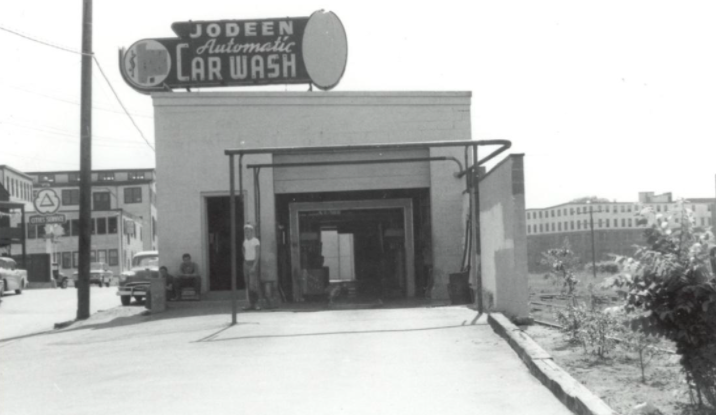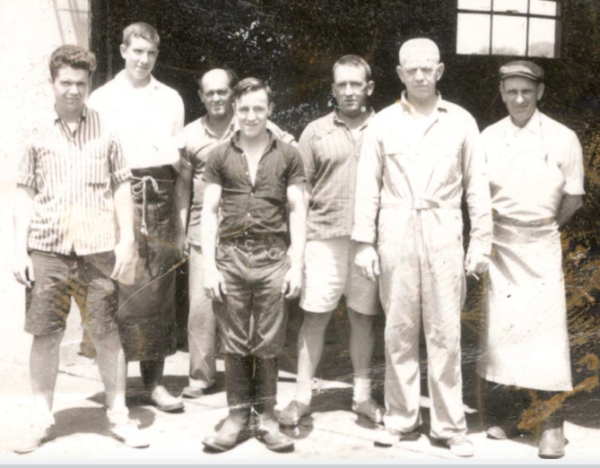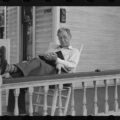Somebody Loves Us All: Finding Beauty in a Filling Station

Through boyhood and college and for several years thereafter, during the 60s to the 80s, I worked at my father’s car wash, a green-painted building he built with his own hands, cinder block by cinder block. He named it Jodeen Car Wash, after me (Jody) and my sister (Maureen). In its heyday, Jodeen was the busiest and best car wash around.
Dad ran an efficient operation. As cars entered the building, the starting line guys vacuumed the inside flooring and removed mats and scrubbed and rinsed them down. They used steam guns and scrub brushes dipped in caustic soap to clean and scour the wheels and rocker panels and bumpers. Then they attached the cars to the running chain with a rope-bound hook. As the cars advanced through the wash bay area, they were sprayed with reclaimed water collected and recycled from previous washes. It was a softer and superior cleanser than hard city water. The wash bay workers, with their yellow aprons and rubber suits and gloves, covered the exterior of the cars with liquid detergent from large stainless-steal tubs. They applied the detergent with scrub brushes, the dirt and grime disappearing under their broad strokes. After a final rinse from overhead pipe sprays, the cars passed through the deafening blower-dryer to the finishing line, where they were dried and polished with recycled cloth towels.
Many years after my father decided to retire and sell the place, I came across a poem—Elizabeth Bishop’s “Filling Station”—that brought me back to that time, that made me see those days with fresh eyes. I wasn’t sure why Bishop’s words about a dirty gas station roused in me such strong feelings. I knew, however, that there was something inside the tightly-written 180-word six-stanza poem that I found sublime, something that spoke to what I’d experienced so long ago.
Bishop starts the poem by framing the filling station’s dirtiness. We see a place swimming in a dark slippery translucent griminess that permeates everything. Through its “disturbing, over-all / black translucency” we visualize it through a lens of dirt and oil:
Oh, but it is dirty!
—this little filling station,
oil-soaked, oil-permeated
to a disturbing, over-all
black translucency.
Be careful with that match!
She notices the filling station is being run by a family:
Father wears a dirty,
oil-soaked monkey-suit
that cuts him under the arms,
and several quick and saucy
and greasy sons assist him
(it’s a family filling station),
all quite thoroughly dirty.
My father’s car wash building wasn’t “oil-soaked,” but it got dirty, and was difficult to keep clean. It certainly shed its grime on us, Dad’s “quick and saucy and greasy sons.” At home each night after work, spotted with grit and smelling of kerosene, we needed to take pains to return to our shiny, pleasant-smelling, shampooed baselines.
Like the father in the poem, my father wore a kind of monkey-suit—grey coveralls—which at the end of the day got dirty, though not “oil-permeated.” Every morning saw my father don a freshly-washed new pair. He always had a clean supply to draw on, and deposited his used coveralls in the hamper each evening, after eating a warm supper and spending hours in conversation with my mother and my sister and me. Each Christmas he’d get a new supply, for the next years’ work. He’d complain how his “family gives presents to keep me working,” but we knew how proud he was of his self-built car wash.
Dad employed numerous full- and part-timers. With me in the mix, we were his car wash “family.” In the busy winter months, twenty or more workers were needed to keep the long lines going; in the slower summers he operated with as little as six.
Bishop wonders if the family lives in the station. She cites evidence that someone is making this a home: “cement porch” with “a set of crushed and grease- / impregnated wickerwork;” and “on the wicker sofa / a dirty dog, quite comfy.” Not only is the place oily and greasy, it’s physically hard—the porch is made of cement. But in this dirty, hard place their dog is “quite comfy.” In a setting as unpleasant as this family’s filling station home, we’re able to find contentment:
Do they live in the station?
It has a cement porch
behind the pumps, and on it
is a set of crushed and grease-
impregnated wickerwork;
on the wicker sofa
a dirty dog, quite comfy.
I didn’t live at the car wash, but I often felt I couldn’t get away from the place. I spent countless after-work hours with my father, repairing broken pipes, sweeping floors, washing towels, getting the car wash ready for the next morning.
My father didn’t live at the car wash either, but he loved his creation and spent so much time keeping it afloat that it became his second home. After closing for the day and traveling home for his supper and for rest, he returned to the car wash each evening. When something needed fixing, he seldom hired a specialist, preferring to do the work himself. He became consumed with car wash projects—repairing plumbing, fixing the massive iron chain that pulled cars through the building, tarring the roof, cementing concrete cinderblocks for an extension to his building. He learned by trial and error, often visiting Zolotas’ Hardware store to collect tools, devices, and advice. We weren’t surprised when Dad got home late at night with gashes on his arms or hands or even his face, from his physical dealings with the place. But, no matter; the very next day he’d be bandaged up and ready to go.

The author's father (second from right), and employees of the car wash.In stanza four, Bishop takes us on a journey of “seeing.” She lists items having “color” or “life” or semblance of “beauty.” “Comic books” providing “certain color.” “A big dim doily / draping a taboret,” next to “a big hirsute begonia.” It’s like watching a black and white movie with colorized, and “dim,” slices of humanness strewed about. The begonia—“big” and “hirsute”—is overgrown and untrimmed and hairy, an unkemptness rivaling those “saucy” sons and “monkey-suited” father:
Some comic books provide
the only note of color—
of certain color. They lie
upon a big dim doily
draping a taboret
(part of the set), beside
a big hirsute begonia.
At the car wash, we had our own version of life’s color. One of Dad’s “saucy sons” set up a make-shift piped-in stereo system. He rigged a record player and a couple of speakers on a loft that hovered over the office and set it to repeat his album favorite—Herb Alpert and the Tijuana Brass. I can still hear “A Taste Of Honey” filling the air at the car wash finish line. The deafening noise of the blower/dryer would temporarily block out this music, but when the car was done and the blower’s noise ceased, we’d again hear Herb and his Brass. The monotony of listening to a single album repeated throughout the day irritated one of our older employees, but his grumble only served to delight the saucy son culprit, an obsessive teaser.
During the summers, Dad grew tomato plants behind the green-painted cement cinderblock wall, where the building faced the railroad tracks. Anybody walking the tracks and seeing the tiny garden on top of the cement blocks most likely thought the growth was a mere cluster of weeds.
One scorching day, I unlocked the car wash coke machine to grab a bottle of water and was surprised to find Dad’s tomato plants inside. They were in separate pots and their stems and leaves looked young and green and felt cold. In the extreme heat, my father had decided to give his precious tomato plants a break. Finding plants inside a coke machine was a surprise, but it wasn’t a surprise that Dad was responsible. Acts of tenderness were as much a part of his being as was his ruggedness. I remember him welcoming back—without animus—employees who had been absent for weeks on alcoholic binges. I remember him encouraging an employee’s talent for electrical and mechanical devices, making him his right hand man, someone whose special aptitude came in handy when car wash motors needed repair. I remember the way he nurtured employees with intellectual difficulties, patiently teaching them every aspect of the job, providing them with meals and clothing, contributing to their health, happiness, and reputation as some of his best workers.
His kindness didn’t come at the expense of his standards. He insisted that his employees be punctual, that they treat customers respectfully, and always work hard. They responded by giving their best effort, day in, day out.
Why, Bishop asks, at such a dirty, repugnant place, would someone have the particulars of a homeplace:
Why the extraneous plant?
Why the taboret?
Why, oh why, the doily?
(Embroidered in daisy stitch
with marguerites, I think,
and heavy with gray crochet.)
Then, in the final stanza, Bishop wonders who cares for this family. Who it is that loves them, that supplies life’s niceties. She is humorous (“waters the plant, / or oils it, maybe”) and when she mentions “high-strung automobiles,” I understand it to mean that most people driving through might feel revulsion, not recognizing that happy, decent living happens here.
The poem’s final line, “Somebody loves us all,” contests its first line. So we can say, “Oh, but it is dirty!” and reply, yes, but “Somebody loves us all.” This may be another way of saying “We are all different in our own way but we are all God’s children.” It also reminds of those unheralded and invisible “Somebodies” who spur the living in our lives, who add joy to our existence, even in ugly, difficult, dirty circumstances. Those who should be recognized for the love they provide:
Somebody embroidered the doily.
Somebody waters the plant,
or oils it, maybe. Somebody
arranges the rows of cans
so they softly say:
ESSO-SO-SO-SO
to high-strung automobiles.
Somebody loves us all.
This emphasizes the feminine, domesticizing quality of the “god” of the filling station, but at the car wash, it was my father who was our family’s version of Bishop’s “Somebody.”
Dad was friends with the area car wash owners. He was closest to Ronny, owner of a car wash–autobody combo in Danvers. One time, while visiting with Ronny, Dad overheard a customer disparaging the “morons” employed at Jodeen’s. My father confronted the customer and said, “Let me tell you something. You couldn’t come close to doing as good a job as those guys you’re calling morons.” He likely aimed his right index finger at the guy’s chest.
One busy Saturday morning at the car wash, when I was a teenager working the finish line, I’d witnessed my father’s defense of his employees. We were toweling cars dry after they’d gone through the blower-dryer. A well-dressed man complained that his car was still dirty and started shouting, saying our grey towels were soiling his car. He was thirty-ish and large, taller than my sixty-ish, white-haired father. An older employee, our “finisher”—a small, thin man who schmoozed customers to get us tips—backed away. So did a “weekender,” working to supplement his Peabody tannery job. This customer wasn’t just complaining. He was letting us know we were inept. We didn’t “know what the hell” we were doing. To make matters worse, he was jamming the operation, a dozen cars in line. My father, who worked in every area—the starting line, the wash bay, the cashier’s office—was with us, drying cars.
When the customer’s voice ramped up, my father stopped working, walked over to the guy and yelled, “Shut the hell up! Who do you think you are? Be quiet and get the hell out.” The customer went silent. He apologized. He walked to his car with my father, quietly clarifying his concern. His arm ended up around my father’s shoulder, in gentle embrace. He apologized again, handed over his cash payment, and drove off slowly. When it was over, we turned and began drying off the next customer’s car with our clean grey towels.
My father made us feel safe. His employees were his people, and he’d be damned if he was going to let anyone ridicule them. Sure, some of his employees had problems, and being a car wash employee was nobody’s idea of a choice career. Anyone passing through and wondering how we could work in the wet and dirt and cold and boredom of a car wash might not realize that this was a place of camaraderie, gentleness, mutual respect, of pride in the product we produced—clean cars. We talked courteously to each other, always acting gently and listening attentively to each other’s humor and stories. My father’s workers dignified this cold, boring, repetitive job with our consistently good effort. We transformed every filthy car that entered our car wash into something that shined.
About Joseph O'Day
Joseph O’Day’s writing focuses on the personal essay form, exploring family relationships and life transitions. His work has appeared in Biostories, Adelaide Literary Magazine, Molecule: A Tiny Lit Mag, The Salem News, The American Journal of Health-System Pharmacy, and Focus on Faulkner. He received his MA in English (Creative Writing) from Salem State University and served as Nonfiction Editor of Soundings East, Salem State’s literary journal.





